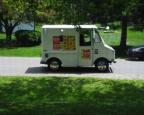Act 3, Scene 16: “Stop and Smell the Flowers”

And stop and pick up a rock.
And stop and watch an ant.
And stop and scoop up pebbles.
And stop and tug at a blade of grass.
TRL takes a walk with C and E before dinner. A nice saunter down the block. C and E insist on holding TRL’s hands, and the entire unit moves at a reasonable pace. TRL is loving it. A nice walk outside with his boys. Maybe the boys have finally gotten to an age where TRL can share some of his pleasures with them. Maybe this marks the beginning of the Father-Son(s) thing.
But then the boys decide that they don’t want to hold dad’s hands.
OK, no problem.
They get to the end of the block and turn around. Let’s go home for dinner, announces TRL.
Dinner, repeat the boys.
And then E becomes enchanted with his shadow, the falling early summer sun stretching his body image along the sidewalk.
Shadow!
Yes, shadow, says TRL.
Shadow!
Yes.
And C sits down and begins scratching at the edges of the sidewalk at the grass line for really good pebbles.
Guys, mommy is coming home, and it’s dinner time, TRL announces. Guys, come on, please get up. Walk.
And they do. A whole five feet before a dandelion captivates them.
And then a bird sitting on a front lawn.
Guys, either you walk or I carry you.
No carry, walk, E responds.
Then walk, says TRL.
Another five feet. And another fascinating must-see event unfolding before them. The sharp needles on a pine tree. A smushed bug on a tree stump. Another rock.
TRL’s predinner constitutional has turned into The Never Ending Journey. And he has gone from happy-go-lucky dad sharing a special time with his sons to a drill sergeant barking instructions every 20 seconds: Walk. Walk.
After another ten minutes and 20 feet, TRL can see their house.
Look guys, home.
C and E’s house, they respond in unison.
Mom will be home soon, and it’s dinner time, says TRL. Come on guys, let’s go.
But like the mathematical construct of choosing two points along a line, and by continually halving the distance between them, you never actually arrive at the farther point, home gets closer but to TRL it seems they will never actually arrive.





